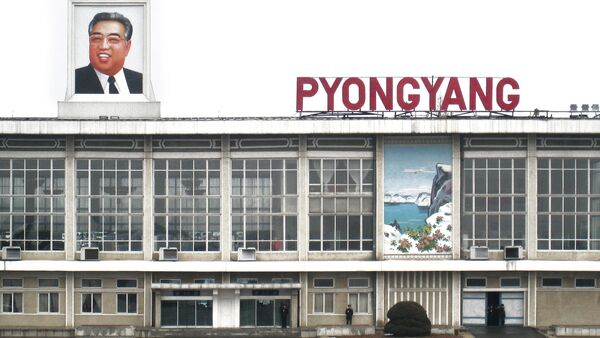Through its refusal to talk with North Korea (something that it has long said it wants to do), the US revealed the hypocrisy behind its policies. It isn’t interested in peacefully resolving the nuclear issue, but rather in keeping it frozen, since every inch of progress on the topic is conversely a strategic retreat for the US’ plans in Northeast Asia. North Korea may have felt emboldened by the fact that Cuba, formerly an ‘enemy’ of the American political establishment for over half a century, could strike a deal with the US (however one-sided), and may have wanted to try its hand at this as well. The thing is, North Korea isn’t Cuba, and the US needs the nuclear ‘threat’ to continue indefinitely in order to complete the construction of an Asian NATO and continue its containment of China.
The Convenient Fool
Ever since the Korean War, US policy makers had only one intended role for North Korea, and that’s been as the convenient fool to justify their military presence in Northeast Asia. This trope continued after the Cold War, with North Korea’s nuclear weapons program replacing the formerly perceived threat of a combined North Korean-Chinese invasion of the South. Carried over into the 2000s, Pyongyang began testing nuclear bombs and issuing strongly worded condemnations of American military activity in the region.
By doing so (and exaggerated by the politically minded Western mainstream media apparatus), they raised the threat perception of their country among Americans and cemented themselves as the ‘eternal bogeyman’ in millions of people’s imaginations. This conveniently created the seemingly never-ending cycle of American response-North Korean reaction that continued to create an even deeper American presence in the region and promote closer coordination between its South Korean and Japanese allies.
‘The Cuba Effect’
Given the perpetual cycle of action-reaction between the US and North Korea, it was certainly a surprise when Pyongyang suddenly offered to suspend its nuclear program in exchange for the US discontinuing its military drills with South Korea. Up until this point, North Korea seemed to enjoy playing the convenient fool, so their proposal caught many off guard. What could possibly explain their behavioral turnaround is the US’ recent deal with Cuba, which may have served as an inspiration for them to extend the olive branch and re-enter the diplomatic sphere.
Despite not being in Cuba’s best interests, the fact that the US did in fact make a deal with a former ‘pariah state’ could have emboldened North Korea to think that it may be next on the negotiating list. As the logic goes, if the US can talk to Iran and now Cuba, why not North Korea? After all, Washington had been asking for such an opportunity for years now, and if one were to believe the Western press reports, it was all in the good faith of reaching a peaceful solution to the North’s nuclear program.
No, No, No!
Therein lies the problem – the Western press rarely reports on how the Northeast Asian sector of the US’ Pivot to Asia is largely dependent on prolonging the North Korean ‘threat’ as long as possible in order to provide the ‘plausible justification’ for containing China. The US’ resolute rejection of the North Korean offer is indicative of its true intentions in the region. Addressing the matter, Jen Psaki said:
“The DPRK statement that inappropriately links routine US-ROK exercises to the possibility of a nuclear test by North Korea is an implicit threat”
Through that single sentence, she accomplished two political goals – rejecting the North Korean’s olive branch offer and manipulating it into an “implicit threat”. The US needs to continue holding provocative military drills with South Korea (many of which have been in close proximity to North Korea’s borders and even used live ammunition) in order to provoke the ‘convenient fool’ reaction that it so desperately needs to justify its Asian Pivot.
The said pivot doesn’t just deal with the buildup of American forces, but also entails the implicit construction of an Asian NATO to contain China, as well as the establishment of a missile defense shield to nullify its nuclear capability. Under the arrangement, South Korea is intended to bolster its military forces, while Japan is anticipated to revoke its pacifist past and move towards a renewed militancy, both of which are currently happening. The US wouldn’t dare publicly say that these are the end objectives of its plans, hence why it resorts to using North Korea as the convenient fool in bringing them about.
But now that North Korea has shown that it is serious about suspending its nuclear program, the State Department is in a panic since it never expected such a diplomatic development to emerge from the ‘Hermit Kingdom’. Pyongyang called Washington’s bluff, and Psaki unwittingly proved the obstinacy of American policy towards North Korea by showing that it only cares about continuing its provocations towards the country. For as long as a peaceful and mutually acceptable approach (not a one-sided pro-American one) is on the table, then the US will keep screaming ‘No!’ and rejecting any proposals for resolving the crisis.




